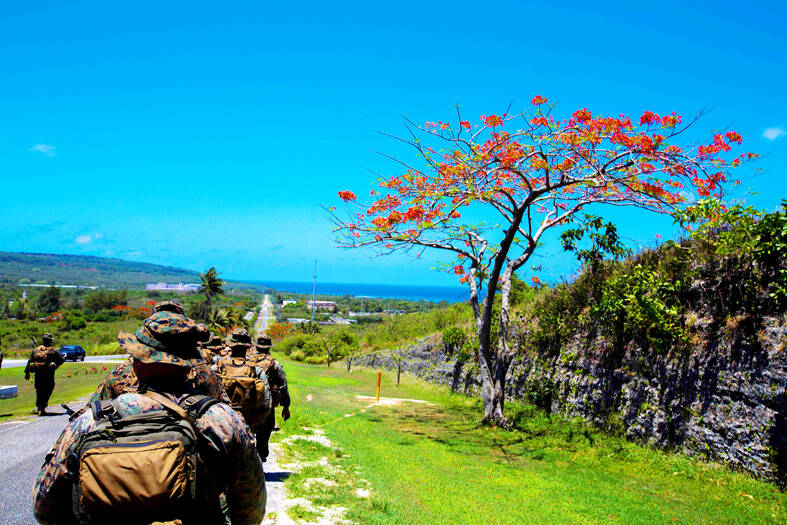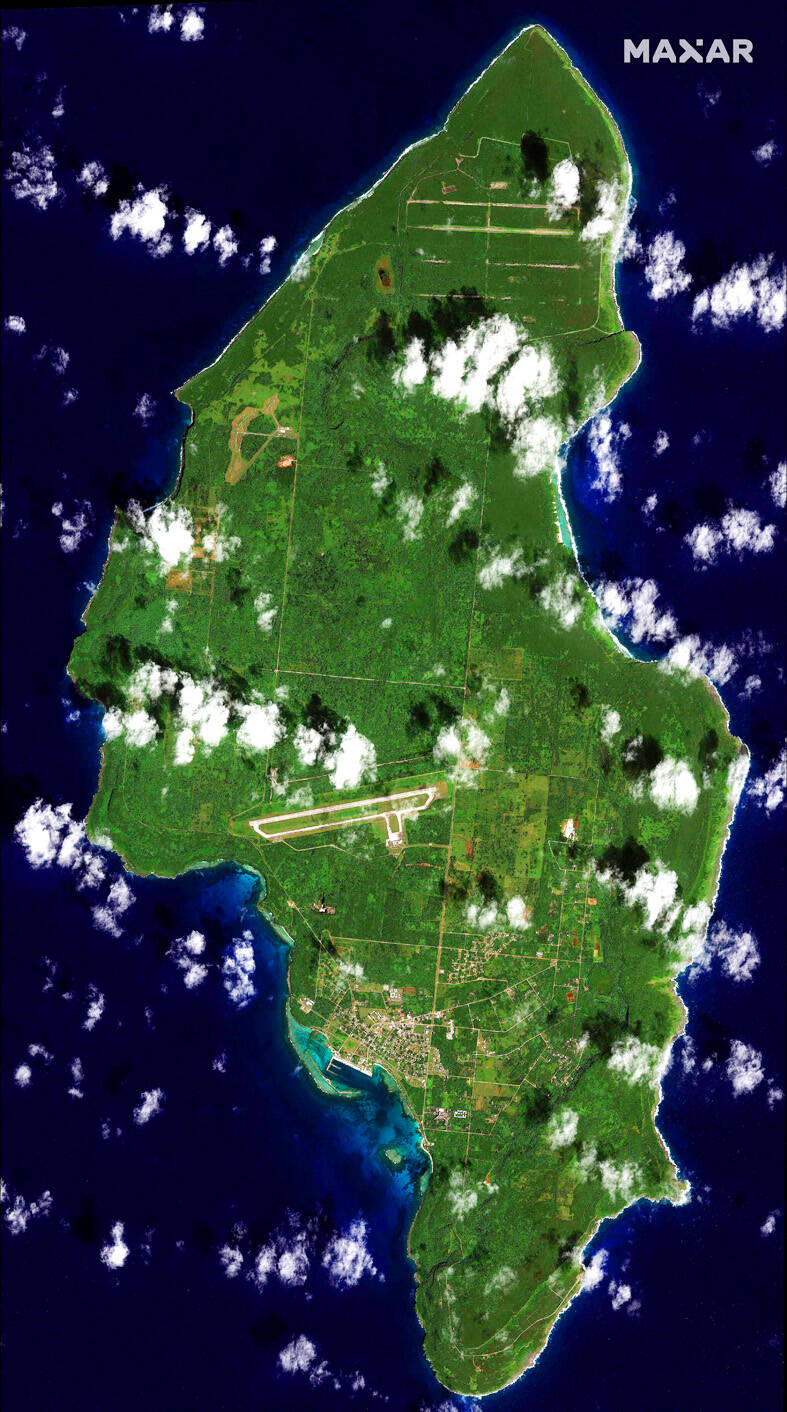In the middle of the Pacific ocean, an abandoned US airfield once key to dropping the nuclear bomb on Japan — and nearly lost to history amid encroaching forest — is being revived.
As the US hacks away at the jungle overgrowth at Tinian island airfield and other old, World War II-era bases across the region, it would not be with Japan on their mind.
Rather, it is Beijing’s growing influence in the Pacific that is spurring the recovery of a slew of abandoned runways on the 100km2 speck of land that makes up Tinian, part of the US territory of the Northern Mariana Islands.

Photo: AFP / Lance Corporal David Diggs / US Marine Corps
“Rehabilitation of World War II-era airfields has provided Pacific Air Forces [PACAF] a rapidly executable avenue to enhance infrastructure in the region,” a spokesperson said.
Although the statement mentioned a “sense of urgency” enabling the forces to “enhance ... warfighting capability and improve deterrent posture alongside allies and partners,” it did not mention China directly.
Washington’s plans for what officials have described as “an extensive” facility on Tinian comes amid a serious military pivot to the Pacific in the past few years — and as China builds its own new bases in the region, including in disputed waters.

Photo: handout / Maxar Technologies / AFP
“The most comprehensive and serious challenge to US national security is the [People’s Republic of China’s] coercive and increasingly aggressive endeavor to refashion the Indo-Pacific region and the international system to suit its interests and authoritarian preferences,” reads the US Department of Defense’s 2022 planning document, called the National Defense Strategy.
Tinian’s old military airfield “has extensive pavement underneath the overgrown jungle. We’ll be clearing that jungle out between now and summertime,” US Air Force General Kenneth Wilsbach recently told Japanese outlet Nikkei Asia.
Meanwhile, military projects for “fuel and airfield development” at the island’s nearby civilian airport are already underway, the PACAF spokesman said.
If little known now, the airfield at Tinian was perhaps the most important — and the busiest — in the world in 1945, as its six hastily built runways played host to US B-29 bombers carrying out missions against Japan, 2,300km away.
Including, on Aug. 6 and Aug. 9 of that year, the planes that dropped nuclear bombs on Hiroshima and Nagasaki. “Little Boy” and “Fat Man,” as the weapons were known, killed 200,000 people.
In the past three years, money annually allocated to Indo-Pacific military construction costs has doubled, from US$1.8 billion in 2020 to just shy of US$3.6 billion this year, a recent report from the US Congressional Research Service showed.
It is part of a Pentagon strategy to open a range of flexible military bases, able to operate outside of the larger, longstanding installations in Japan, South Korea and the US island territory of Guam.
On Tinian, initial work started near the civilian airport in February last year, before extending toward the World War II airfield on the north of the island.
Within two years, tarmac rehabilitation and the construction of fuel tanks are set to be completed, at a budget of at least US$162 million, part of contingency plans in the event “access to Andersen Air Force Base or other western Pacific locations is limited or denied,” Air Force financial documents showed.
Across multiple projects at Tinian, the total cost is unclear, “due to differing timelines and requirements, and the fact that not all work is being executed by the US Air Force,” the PACAF spokesperson said.
Tinian is not the only World War II-era base being revamped: New defense appropriations also include money for construction at Cesar Basa Air Base in the Philippines, “along with ongoing projects” at the Royal Australian Air Force’s Darwin and Tindal bases, the spokesperson said.
“A lot of our strategy there is taking many of the World War II airfields that frankly are overgrown by the jungle, and there’s still concrete or asphalt underneath,” Wilsbach said in a September speech. “We’re not making super bases anywhere. We’re looking for a place to get some fuel and some weapons, maybe get a bite to eat and take a nap and then get airborne again.”
Not far off, satellite images show other military developments — from China, which has created artificial islets among the diplomatically contested Spratly Islands (Nansha Islands, 南沙群島), used to host its own air bases.

ELECTION DISTRACTION? When attention shifted away from the fight against the militants to politics, losses and setbacks in the battlefield increased, an analyst said Recent clashes in Somalia’s semi-autonomous Jubaland region are alarming experts, exposing cracks in the country’s federal system and creating an opening for militant group al-Shabaab to gain ground. Following years of conflict, Somalia is a loose federation of five semi-autonomous member states — Puntland, Jubaland, Galmudug, Hirshabelle and South West — that maintain often fractious relations with the central government in the capital, Mogadishu. However, ahead of elections next year, Somalia has sought to assert control over its member states, which security analysts said has created gaps for al-Shabaab infiltration. Last week, two Somalian soldiers were killed in clashes between pro-government forces and

Ten cheetah cubs held in captivity since birth and destined for international wildlife trade markets have been rescued in Somaliland, a breakaway region of Somalia. They were all in stable condition despite all of them having been undernourished and limping due to being tied in captivity for months, said Laurie Marker, founder of the Cheetah Conservation Fund, which is caring for the cubs. One eight-month-old cub was unable to walk after been tied up for six months, while a five-month-old was “very malnourished [a bag of bones], with sores all over her body and full of botfly maggots which are under the

BRUSHED OFF: An ambassador to Australia previously said that Beijing does not see a reason to apologize for its naval exercises and military maneuvers in international areas China set off alarm bells in New Zealand when it dispatched powerful warships on unprecedented missions in the South Pacific without explanation, military documents showed. Beijing has spent years expanding its reach in the southern Pacific Ocean, courting island nations with new hospitals, freshly paved roads and generous offers of climate aid. However, these diplomatic efforts have increasingly been accompanied by more overt displays of military power. Three Chinese warships sailed the Tasman Sea between Australia and New Zealand in February, the first time such a task group had been sighted in those waters. “We have never seen vessels with this capability

‘NO INTEGRITY’: The chief judge expressed concern over how the sentence would be perceived given that military detention is believed to be easier than civilian prison A military court yesterday sentenced a New Zealand soldier to two years’ detention for attempting to spy for a foreign power. The soldier, whose name has been suppressed, admitted to attempted espionage, accessing a computer system for a dishonest purpose and knowingly possessing an objectionable publication. He was ordered into military detention at Burnham Military Camp near Christchurch and would be dismissed from the New Zealand Defence Force at the end of his sentence. His admission and its acceptance by the court marked the first spying conviction in New Zealand’s history. The soldier would be paid at half his previous rate until his dismissal